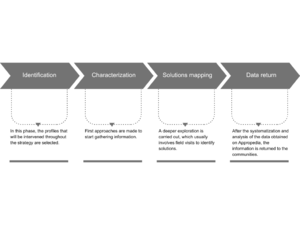
The documentation of findings, best practices, and lessons learned from development-promoting organizations in El Salvador has generated genuine interest among communities, individuals, and other organizations actively participating in this process. This is due to several reasons. Firstly, the wiki, being easily accessible, allows documented information to be understood intuitively. Moreover, the fact that open content can be edited implies that communities or organizations can manage, modify, and update the information provided to them, even tracking through the history who has edited the available pages of a documented development initiative. However, it is important to mention that, to take advantage of this opportunity for community empowerment, it is essential to develop skills related to the proper use of the platform and open documentation. Often, given the complexity that using certain tools within the platform can entail, it is necessary to have basic knowledge of editing, writing, and programming, which, while they can be obtained in a self-taught manner, can also be gratifying to learn through a collaborative learning experience.
As part of the primary collection for this research, development-promoting organizations were asked how documenting project learnings on an open knowledge platform can ensure that the communities involved in this process have access to the collected information, while also providing greater reach for the documented results of social development projects. To address this question, it is necessary to present a working model implemented by TECHO El Salvador, where the Information Gathering Methodology (IGM) was integrated with the methodology used in the Solution Mapping practice of the UNDP Accelerator Lab in El Salvador, with a particular emphasis on the final phase dedicated to data feedback. This methodological model can be visualized in figure 4.
As previously mentioned, the first three phases of this methodological strategy will not be described in depth as they do not involve direct documentation of the learnings from a development initiative. However, their implementation is necessary to reach the final phase, which is data feedback.
There are two examples that help understand how this model is used. The first is the project already mentioned throughout this article called ''Profiling of communities and mapping of solutions related to access and use of water in the coastal area of the Department of La Libertad''.[1] The second example is the 'Base Environmental Solutions Mapping Tour' by the UNDP Accelerator Lab in El Salvador, derived from the ''Liquid Cartographies''[2] project. Both initiatives involved the participation of development organizations and communities in El Salvador. An initial approach was made through in-person and virtual meetings, followed by field visits, resulting in the systematization and analysis of data documented on Appropedia. For the first project, six communities in La Libertad were selected for community profiling. A limitation to highlight from this activity is that it was initially planned to fill in the profiling data directly on Appropedia during community visits and conversations with residents. However, editing the wiki from the mobile phones of the volunteers in the field proved difficult due to connectivity and editing issues, so information was conventionally filled out on paper forms. The collected data was later edited on the platform using a computer.
The results of this profiling were returned to the communities through an activity where a physical flipchart was presented, and the pages available on Appropedia were shared with the residents. This generated interest because, with open documentation, the communities now have a community profile available on an easily accessible website. However, the executing organization noted that follow-up to this interest was not provided because most people did not have access to a computer to document information. As previously mentioned, doing so from a mobile phone is a slower process.
Regarding the mapping tour executed under the 'Liquid Cartographies' project, a series of field visits were made to ten development-promoting organizations in El Salvador working on environmental issues. As a result of these visits, a systematization and data analysis were created, translating into an open repository of grassroots environmental solutions shared with each involved organization and used by them to highlight some of their work nationally. This experience allowed members of these organizations to edit, modify, and share the information on the wiki, gaining ownership of the open content available. From this, emphasis must be placed on the importance of organizations designating an internal member responsible for documenting their learning processes on an open platform, maintaining the content, and monitoring the created documentation periodically to prevent vandalism or spam — one of the challenges commonly faced by users and open content creators on the wiki.[3]
In conclusion, within learning processes, open documentation is essential because it not only facilitates access to information but also empowers communities by enabling them to manage and share acquired knowledge. However, it should be noted that for people to maintain their interest in the open documentation process over time, it is important that they can use the platform effectively. In this regard, a collaborative learning process, such as training, workshops, courses, among others, are the most effective tools. Likewise, development-promoting organizations interested in presenting their project findings through open knowledge must be willing to designate internal members responsible for controlling the content to be made public.
- ↑ "Water Mapping in La Libertad," Appropedia, accessed October 8, 2023, https://www.appropedia.org/Water_Mapping_in_La_Libertad
- ↑ "Liquid Cartographies," Appropedia, accessed October 24, 2023, Liquid Cartographies
- ↑ Joshua M. Pearce, "Appropedia as a Tool for Service Learning in Sustainable Development", Journal of Education for Sustainable Development, vol. 3 n. 1 (2009): 3. https://doi. org/10.1177/0973408209003001